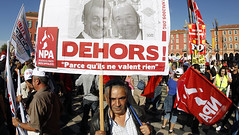
French workers in Nice striking against the planned pension reforms initiated by the conservative government of President Sarkozy. This is the second general strike in less than a month.
Originally uploaded by Pan-African News Wire File Photos
By Helene Fouquet and Gregory Viscusi - Oct 22, 2010
French President Nicolas Sarkozy ordered striking refinery staff back to work to ease fuel shortages as the Senate planned to vote on his proposal to raise the retirement age.
Workers at Total SA’s Grandpuits refinery southeast of Paris, one of the 11 that have been shut in protest strikes, said they would challenge the order in court as unions called for a walkout next week, extending protests against his pension overhaul into an eighth week.
“There is a right to strike but there is no right to prevent people from working and traveling,” Energy Minister Jean-Louis Borloo said today on BFM television. He said about 20 percent of the country’s service stations were dry.
Senate passage of the bill, likely to come tonight, won’t quell opposition to the plan to raise the retirement age to 62 from 60 and the age for a full pension to 67 from 65. Violence has begun to break out at protests this week, with Sarkozy threatening to crack down on “rioters.”
“We will never accept this law,” Jean-Claude Mailly, secretary general of Force Ouvriere, said today on RMC radio. “Just because a law has been voted through doesn’t mean we just say: ‘Oh, too bad.’”
Seeking to mute the disruptions, the government moved to speed parliamentary passage of the pension bill, invoking a rule yesterday that allows the Senate to cast a single vote on the legislation and 200 remaining amendments. Senators will vote on it tonight, said the chamber’s president, Gerard Larcher.
At the Grandpuits refinery, a crowd of activists blocked riot police from entering the plant. All 11 of France’s active refineries have been on strike for at least a week.
‘Scandalous’ Order
Unions said they would contest the move in the courts. “There is a right to strike,” Charles Foulard, a CGT union organizer, said on BFM. “This is scandalous, this is not what you do in a country with human rights.”
Prime Minister Francois Fillon called for a meeting of fuel suppliers and distributors today in Paris, according to an e- mailed statement from his office.
Following Senate passage, a joint Senate and National Assembly committee should meet Oct. 25 to iron out differences between their versions of the bill, and parliamentary passage should be completed by the middle of next week, Larcher said.
Unions are divided about whether to continue the protests after the bill has passed parliament. At a press conference last night hosted by eight unions, the CFDT and the CFE/CGC said they will call off protests after parliamentary passage.
Union Doubts
Marcel Grignard, a CFDT negotiator, said last night that the union won’t take any steps “that put in doubt the legitimacy of parliament’s right to legislate.”
The overall impact on France’s economy “for the moment is not significant,” Laurence Boone, an economist at Barclays Capital in Paris, said in a note to clients.
A 22-day strike in 1995 cut 0.2 percentage points from gross domestic product for one quarter. “To date, there have been only a few days of strikes, and these were not observed 100 percent” thanks to a law that ensures minimum service levels in key industries and that didn’t exist in 1995, she said.
The French Chemical Industry Union said in a statement it is losing “100 million euros ($140 million) a day” because of the strikes, without giving details.
Air France has lost 25 million euros in revenue. Thierry Gregoire, president of hotel federation UMIH, said on BFM that cancelations are running 50 percent above normal.
Protesters Arrested
Between 4,000 and 17,000 students demonstrated in Paris yesterday, along with as many as 5,000 in the southwestern city of Bordeaux and about 1,500 in Montpellier in southern France, according to police and student union figures. Police arrested 29 youths in Lyon yesterday after riots and also faced skirmishes in the western city of Poitiers.
“Rioters will not have the last word in a democracy, in a republic,” Sarkozy said in comments in Bonneval, in western France. Rioters “will be arrested, tracked down and punished, in Lyon and elsewhere.”
Today is the last day of school before the All Saints mid- term break. School resumes Nov. 4.
The national railway remains slightly disrupted while the Paris metro and the airports are functioning normally. Eight out of 10 high-speed trains will run today and six of 10 commuter and regional trains will operate. Eurostar trains to and from the U.K. will work normally and the Thalys network to Belgium, the Netherlands and Germany will be “almost” normal, rail operator SNCF said in a statement.
Other European countries, including Germany, Italy and Britain, have recently raised their retirement ages or extended the number of years of work needed to qualify for a pension.
Sarkozy’s government says the retirement overhaul is needed to balance the pension system’s budget by 2018. The changes are part of its efforts to reduce the overall deficit. This year, the gap will stand at 7.7 percent of gross domestic product and Sarkozy plans to cut it to 6 percent next year.
To contact the reporters on this story: Gregory Viscusi in Paris at gviscusi@bloomberg.net; Helene Fouquet in Paris at hfouquet1@bloomberg.net
To contact the editor responsible for this story: James Hertling at jhertling@bloomberg.net
No comments:
Post a Comment